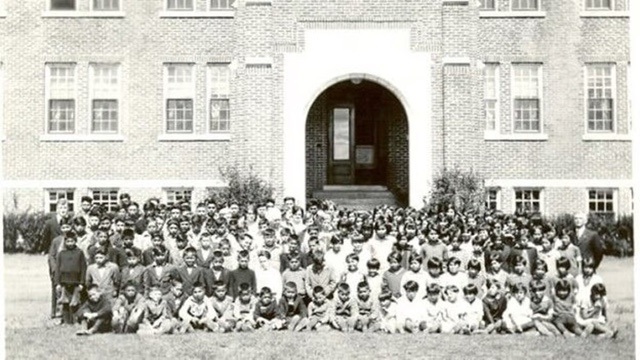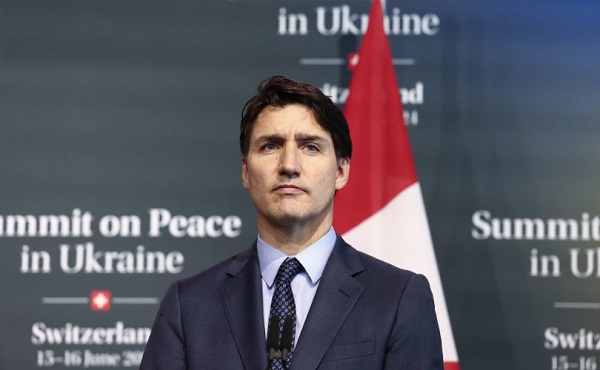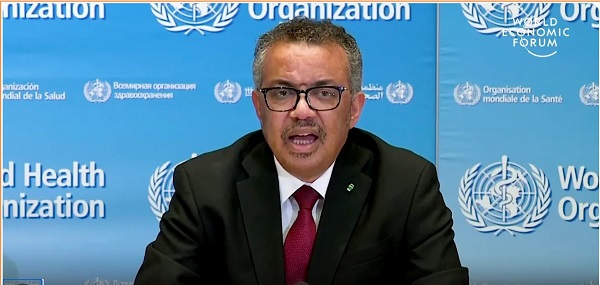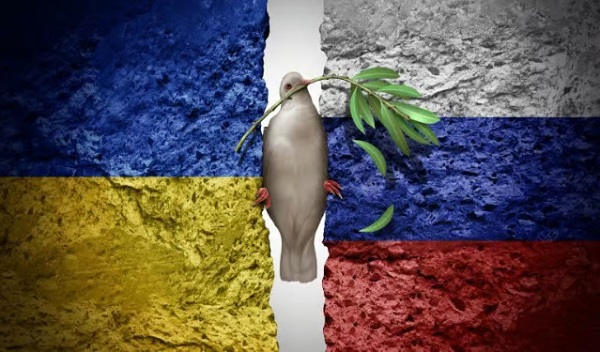Frontier Centre for Public Policy
Did the CBC prove in 1962 that no children are buried at Kamloops?

From the Frontier Centre for Public Policy
By Nina Green
The inclusion of extensive footage from the CBC’s 1962 documentary The Eyes of Children establishes that the CBC has proved that nothing nefarious was happening at the Kamloops Indian Residential School in the early 1960s
The new documentary Sugarcane uses extensive footage from the CBC documentary, The Eyes of Children, filmed in late 1962 at the Kamloops Indian Residential School.
The CBC film crew had access to the entire school and grounds for an extensive period of time, filming girls flocking to walk with the principal, Father Dunlop, senior and junior classes in session, playground activities, bedtime routines, religious services, Christmas preparations, children staying behind at the school during the holiday season because they had no home to go to, and much more.
All these activities at the school are featured in shots and video clips in the new documentary Sugarcane, including a clip of Indigenous teacher Mabel Caron teaching a senior class about telephone manners. In fact there were three Indigenous teachers at the Kamloops Indian Residential School in late 1962 – Mabel Caron, Benjamin Paul, and Joe Stanley Michel, the first graduate of the Kamloops Indian Residential School who returned there to teach and lived with his wife, Anna Soule, another graduate of the school, and their children in a teacherage on the school grounds.
The reason for using extensive footage from The Eyes of Children is not explained in Sugarcane, and is obviously confusing to viewers as Sugarcane is ostensibly about events which occurred at St Joseph’s Indian Residential School in Williams Lake. Why a film about a residential school in Williams Lake includes extensive footage from a decades-old CBC documentary about the Kamloops Indian Residential School is a mystery.
But leaving that mystery aside for explanation by the people who made Sugarcane, the inclusion of extensive footage from the CBC’s 1962 documentary The Eyes of Children establishes that the CBC has proved that nothing nefarious was happening at the Kamloops Indian Residential School in the early 1960s at a time when Canadians are now led to believe 215 children were being murdered and clandestinely buried by fellow students in the apple orchard.
In fact what was happening at the Kamloops Indian Residential School in the early 1960s, in addition to the regular school activities filmed by the CBC, was integration. A residence had been built for senior students, and they were being bussed into downtown Kamloops to attend St Ann’s Academy.
Obviously, the CBC knew all this in 1962 and knows it now.
Is the CBC implying by its silence that three Indigenous teachers and their families at the Kamloops Indian Residential School covered up the murder and clandestine burial in the apple orchard of 215 children? Did the CBC itself cover up these murders and secret burials in 1962?
Or did the CBC know in 1962 and now that nothing of the kind ever happened?
Nina Green is an independent researcher who lives in British Columbia.
Economy
Support For National Pipelines And LNG Projects Gain Momentum, Even In Quebec

From the Frontier Centre for Public Policy
Public opinion on pipelines has shifted. Will Ottawa seize the moment for energy security or let politics stall progress?
The ongoing threats posed by U.S. tariffs on the Canadian economy have caused many Canadians to reconsider the need for national oil pipelines and other major resource projects.
The United States is Canada’s most significant trading partner, and the two countries have enjoyed over a century of peaceful commerce and good relations. However, the onset of tariffs and increasingly hostile rhetoric has made Canadians realize they should not be taking these good relations for granted.
Traditional opposition to energy development has given way to a renewed focus on energy security and domestic self-reliance. Over the last decade, Canadian energy producers have sought to build pipelines to move oil from landlocked Alberta to tidewater, aiming to reduce reliance on U.S. markets and expand exports internationally. Canada’s dependence on the U.S. for energy exports has long affected the prices it can obtain.
One province where this shift is becoming evident is Quebec. Historically, Quebec politicians and environmental interests have vehemently opposed oil and gas development. With an abundance of hydroelectric power, imported oil and gas, and little fossil fuel production, the province has had fewer economic incentives to support the industry.
However, recent polling suggests attitudes are changing. A SOM-La Presse poll from late February found that about 60 per cent of Quebec residents support reviving the Energy East pipeline project, while 61 per cent favour restarting the GNL Quebec natural gas pipeline project, a proposed LNG facility near Saguenay that would export liquefied natural gas to global markets. While support for these projects remains stronger in other parts of the country, this represents a substantial shift in Quebec.
Yet, despite this change, Quebec politicians at both the provincial and federal levels remain out of step with public opinion. The Montreal Economic Institute, a non-partisan think tank, has documented this disconnect for years. There are two key reasons for it: Quebec politicians tend to reflect the perspectives of a Montreal-based Laurentian elite rather than broader provincial sentiment, and entrenched interests such as Hydro-Québec benefit from limiting competition under the guise of environmental concerns.
Not only have Quebec politicians misrepresented public opinion, but they have also claimed to speak for the entire province on energy issues. Premier François Legault and Bloc Québécois Leader Yves-François Blanchet have argued that pipeline projects lack “social licence” from Quebecers.
However, the reality is that the federal government does not need any special license to build oil and gas infrastructure that crosses provincial borders. Under the Constitution, only the federal Parliament has jurisdiction over national pipeline and energy projects.
Despite this authority, no federal government has been willing to impose such a project on a province. Quebec’s history of resisting federal intervention makes this a politically delicate issue. There is also a broader electoral consideration: while it is possible to form a federal government without winning Quebec, its many seats make it a crucial battleground. In a bilingual country, a government that claims to speak for all Canadians benefits from having a presence in Quebec.
Ottawa could impose a national pipeline, but it doesn’t have to. New polling data from Quebec and across Canada suggest Canadians increasingly support projects that enhance energy security and reduce reliance on the United States. The federal government needs to stop speaking only to politicians—especially in Quebec—and take its case directly to the people.
With a federal election on the horizon, politicians of all parties should put national pipelines and natural gas projects on the ballot.
Joseph Quesnel is a senior research fellow with the Frontier Centre for Public Policy.
Addictions
The Fentanyl Crisis Is A War, And Canada Is On The Wrong Side

From the Frontier Centre for Public Policy
Drug cartels, China, and Canada’s negligence are fueling the deadliest epidemic of our time
It took the threat of U.S. tariffs for Canada to wake up to the horrors of the fentanyl epidemic that is destroying young lives and shattering families. Canadians, who panicked over COVID-19 deaths, have hardly noticed that far more healthy Canadians and Americans are now dying from fentanyl overdoses than ever died from COVID.
Yet while Americans confront this deadly epidemic, Canada remains oblivious to how deeply the crisis has infiltrated our borders.
A grim milestone came in 2021 when U.S. opioid overdose deaths exceeded 100,000 in a single year. More than a million Americans have died from opioid overdoses since these highly addictive drugs first entered the market. Today, fentanyl overdose is the leading cause of death for Americans aged 18 to 25.
Behind every kilogram of fentanyl lies half a million potential deaths. Behind every pill—a game of Russian roulette.
Fentanyl is a synthetic opioid so powerful that one kilogram can kill 500,000 people. Its extreme potency makes it both highly dangerous and easy to smuggle. A single backpack thrown across the border can carry $1 million worth of the drug. It is easy to see why so many opportunists are willing to risk their lives producing and selling it. Overdose statistics fail to capture the bodies found in deserts or those murdered in the vicious drug trade.
Fentanyl is produced for a few cents per pill but sold on the street for many times that, making it both profitable and a cheap high. Incredibly addictive, it is found in virtually all street drugs, giving “the most bang for the buck.” Made by amateurs, these drugs are carelessly laced with lethal doses. And because the pills look identical, users never know whether a dose will get them high—or kill them.
But Canada is not just a bystander in this crisis. A loophole in our border laws—the “de minimis” exemption—has turned Canada into a gateway for fentanyl entering U.S. communities. This exemption allows exporters to ship small packages valued at less than $800 directly to customers with minimal border inspection. Chinese exporters exploit this loophole to ship fentanyl precursors into Canada, where they are processed into pills or moved to Mexico under the supervision of Mexican drug cartels.
The Trump administration has pressed Canada to close this loophole. That it has existed for years, almost unnoticed, should shock us to the core.
The problem of fentanyl production within Canada should not be minimized. The RCMP reports that fentanyl labs are appearing across B.C., often producing methamphetamine alongside fentanyl. These small labs supply both domestic and international markets. The threat is real, and it is growing.
Exactly how many Canadians have died from fentanyl overdoses is unclear. However, with Canada’s population roughly one-ninth of the U.S., it is reasonable to estimate that Canadian deaths are approximately one-ninth of U.S. numbers.
But overdose numbers alone don’t tell the whole story. The number of lives wrecked by this drug is staggering. Parents watch their children—once vibrant and full of promise—disappear before their eyes. Their beauty fades, their minds unravel, and their lives collapse into the desperate cycle of chasing the next fix. Some escape. Many don’t. Until death takes them, that is.
The new Trump administration has promised to confront this carnage. “This is a drug war,” Peter Navarro, assistant to the president and director of the Office of Trade and Manufacturing Policy, recently told reporters. “The Mexican cartels have expanded up to Canada, making fentanyl there and sending it down to the U.S. The Chinese are using Canada to send in small parcels below the radar. It’s important that Canadians understand we are trying to stop the killing of Americans by these deadly drugs.”
But while the U.S. acts, Canada hesitates. Trump is addressing the problem—Canada is enabling it.
The Trump administration also views Canada’s lax drug laws and casual attitude toward buying and selling even the most dangerous drugs as an exacerbating factor. However, on the fentanyl issue, it is clear Trump is determined to tackle a problem Canada has largely ignored. He should be commended for this, and Canada should start cleaning up its own mess.
Yet fentanyl smuggling from Canada is only part of a larger issue. Behind the drug trade lies an even more insidious enemy: the Chinese Communist Party (CCP).
The importation of fentanyl precursors from China, facilitated by Mexican cartels, has turned Vancouver into a money-laundering hub for the CCP. Investigative reporters like Sam Cooper and Terry Glavin have revealed the depth of this corruption, despite the Hogue Commission’s failure to expose it fully.
Ryan P. Williams, president of the Claremont Institute, warns that “The fentanyl crisis is part of a larger campaign by the CCP to destabilize Western nations. They flood our streets with poison while corrupting our institutions from within. If Canada doesn’t confront this threat, it will lose not only lives—but its sovereignty.”
Our new “fentanyl czar,” appointed by Prime Minister Justin Trudeau, should not only address the drug crisis but also expose how deeply a hostile CCP has compromised Canada.
Tackling the fentanyl problem will be enormously difficult—likely impossible— for the Trump administration without cooperation from China, Mexico and even Canada. And forcing that cooperation is likely the first part of Trump’s plan.
Canada’s role may be small, but it must take full responsibility for securing its borders and confronting the fentanyl crisis. Trump has forced us to act. Now, if we are serious about restoring our nation’s integrity, we must break the CCP’s grip on our institutions.
In doing so, we will save Canadian lives.
Brian Giesbrecht is a retired Manitoba judge. He is a Senior Fellow at the Frontier Centre for Public Policy. He was recently named the ‘Western Standard Columnist of the Year.’
-

 Justice2 days ago
Justice2 days agoDemocracy watchdog calls for impartial prosecution of Justin Trudeau
-

 2025 Federal Election24 hours ago
2025 Federal Election24 hours agoPoilievre refuses to bash Trump via trick question, says it’s possible to work with him and be ‘firm’
-

 Business2 days ago
Business2 days agoPublicity Kills DEI: A Free Speech Solution to Woke Companies
-

 Dr. Robert Malone2 days ago
Dr. Robert Malone2 days agoWHO and G20 Exaggerate the Risk and Economic Impact of Outbreaks
-

 2025 Federal Election1 day ago
2025 Federal Election1 day agoVoters should remember Canada has other problems beyond Trump’s tariffs
-

 2025 Federal Election1 day ago
2025 Federal Election1 day agoPoilievre to let working seniors keep more of their money
-

 2025 Federal Election2 days ago
2025 Federal Election2 days agoCanadian officials warn Communist China ‘highly likely’ to interfere in 2025 election
-

 COVID-191 day ago
COVID-191 day ago17-year-old died after taking COVID shot, but Ontario judge denies his family’s liability claim





